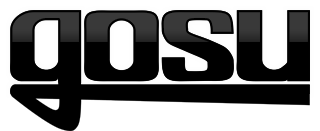
Gosu for C++
Gosu is written in C++ 2017 with minimal dependencies (no boost). It has CMake files for macOS and Linux, Xcode support for macOS and iOS, and project files for Visual C++ 2019.
You can check out the GitHub CI configurations to see which compilers and OS versions are verified to work at the moment.
Installation is especially easy on macOS with Homebrew: brew install libgosu
C++ Project Structure
The wiki has platform-specific guides for setting up C++ projects.
Alternatively, you can take a look at the Gosu port of TheOm3ga’s FreeGemas.
The port is unfinished and rough, but the project can be built for Linux and macOS with CMake, and for macOS and iOS with Xcode.
Ruby/Gosu for iOS, via RubyMotion: motion-gosu
The RubyMotion version of Gosu is a work in progress port and does not support Android.
The motion-gosu GitHub project includes an example project that is structured in a way that makes it easy to run the same code with ‘normal’ Ruby, RubyMotion for macOS, and RubyMotion for iOS.
A Word of Warning…
The C++ and RubyMotion versions of Gosu are not for the faint of heart. They are nowhere near as polished as Ruby/Gosu.
You’ll see terrible error messages, and you’ll need to know your tools well enough to fix them. Poking around the source code often helps, too.
Nevertheless, if you have written a great Ruby/Gosu game, porting it to RubyMotion or C++ might be the best way to share it with the world through Apple’s App Store for iOS and macOS. Please file an issue if you run into unexpected limitations.